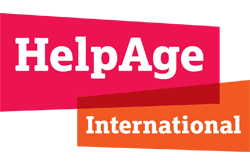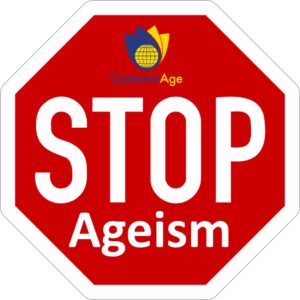All forms of discrimination, such as racism and sexism, are unacceptable, but ageist attitudes appear to go unchallenged. At CommonAge we’re standing with international organisations to identify and challenge inequalities, ageism and discrimination throughout the COVID-19 pandemic and beyond.
 We have given our full support to the HelpAge International open letter sent to António Guterres, Secretary General of the United Nations, in response to the UN policy brief on the impact of COVID-19 on older people released in early May. In this letter, the Secretary General’s intervention is welcomed, but also highlighted are critical gaps that need to be addressed in the UN system in relation to older people. The UN policy brief can be seen here.
We have given our full support to the HelpAge International open letter sent to António Guterres, Secretary General of the United Nations, in response to the UN policy brief on the impact of COVID-19 on older people released in early May. In this letter, the Secretary General’s intervention is welcomed, but also highlighted are critical gaps that need to be addressed in the UN system in relation to older people. The UN policy brief can be seen here.
“We are now requesting your support to ensure the action of the UN system to secure the way forward you identified in your brief. These actions recognise that older persons have long been subject to inadequate protection of their human rights and overlooked in global development and humanitarian efforts as well as in national policies and programmes.”
HelpAge International is calling for the UN to ensure we “build back better” in response to the COVID-19 pandemic. Inequalities, ageism and discrimination need to be addressed in order to ensure that older people’s rights are upheld across the UN system.
![]() We have supported the Global Alliance for the Rights of Older People open letter; this calls on the UN’s leadership ….to ensure that the UN mobilises fully behind your vision of dignity and the protection of the rights of all older persons in response to COVID-19 and beyond. In particular, we ask that you give the Open-Ended Working Group on Ageing the full backing and support of the UN to ensure that its crucial work of strengthening the international legal framework with respect to the protection of older persons’ human rights can be achieved.”
We have supported the Global Alliance for the Rights of Older People open letter; this calls on the UN’s leadership ….to ensure that the UN mobilises fully behind your vision of dignity and the protection of the rights of all older persons in response to COVID-19 and beyond. In particular, we ask that you give the Open-Ended Working Group on Ageing the full backing and support of the UN to ensure that its crucial work of strengthening the international legal framework with respect to the protection of older persons’ human rights can be achieved.”
Ageism in times of COVID-19
Ageism is coming in many forms. For instance, in Nigeria, there are reports of older people being killed being accused of witchcraft – by some governor aids. A HelpAge network member in Kenya reported that older people coming to their centre said that they felt discriminated against and stigmatised and they worry that young people think that coronavirus is a good thing as it is ‘getting rid of older people’.
Meanwhile, in Cox’s Bazaar refugee camp, Bangladesh, health workers were too afraid to treat older people with seasonal flu as they thought they had COVID-19.
In other Commonwealth countries, such as the United Kingdom, Australia and Canada, there is the perceived ageism, where ill-equipped nursing homes are left to care for seniors with COVID-19, without adequate personal protection equipment (PPE) or guidance. In the meantime, hospitals have been well resourced and emptied ready for COVID-19 cases from the community. Furthermore, sector leaders in the UK have highlighted ageist attitudes have almost become endemic on social media with pejorative hashtags such as #BoomerRemover being used to celebrate the fact that COVID-19 seems to have more serious consequences for older persons .
Effects of Ageism
Negative behaviours can have a huge effect on mental health, which in turn can affect physical health. The Royal Society for Public Health’s (RSPH’s) study That Age Old Problem: how attitudes to ageing affect our health and wellbeing highlights:
- Ageist attitudes harm older people as they lead to direct age-based discrimination – which can promote social exclusion, impact on mental health, and affect wider determinants of health like employment.
- Ageist attitudes also harm individuals who, as they grow older, begin to apply negative age stereotypes to themselves. Previous research has shown that those with more negative attitudes to ageing live on average 7.5 years less than those with more positive attitudes to ageing.
- There is now a growing body of research evidencing the real-life consequences that negative attitudes to ageing have on individual health outcomes such as memory loss, physical function, and even the risk of developing dementia.
Ageing in the Commonwealth
 It is vital that older people’s voices are heard by policymakers and the public, in order to defeat ageism, both in the context of a global pandemic and beyond.
It is vital that older people’s voices are heard by policymakers and the public, in order to defeat ageism, both in the context of a global pandemic and beyond.
Ageing in the Commonwealth is a subject of demographic and social complexity. We invite you to read our research paper ‘Ageing in the Commonwealth’; this explores how the challenges of ageing differ across Commonwealth countries and how different governments and societies are responding.
While governments are working to bring in policies and strategies to address some of the issues, there is still much to be done.
How you can help challenge ageism
 Ageism can, and must, be challenged by ensuring that people’s voices are heard when they need to be, and by questioning age discriminatory policies and practices. It is also important to raise awareness of the diversity of older persons and to avoid portraying all older men and women as frail or unable to make decisions.
Ageism can, and must, be challenged by ensuring that people’s voices are heard when they need to be, and by questioning age discriminatory policies and practices. It is also important to raise awareness of the diversity of older persons and to avoid portraying all older men and women as frail or unable to make decisions.
In supporting self-advocacy of older people, and bridging the communication gap between generations, we need the voices of people of all ages to be raised and heard. It can be as simple as listening to the experiences and opinions of an older person and working to ensure that their experiences are heard through our campaign. Examples of ageism in practice should be called out and highlighted.
Our CommonAge Storytelling Project clearly demonstrated how bringing the generations together can be beneficial to all involved. Read more about this project, and the many life stories of older people, written by younger people, from across the Commonwealth here.
Resources
For more information about the HelpAge International campaign to challenge ageism in times of COVID-19 and be a part of it, download the HelpAge International toolkit here.

